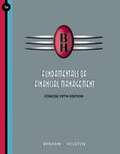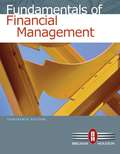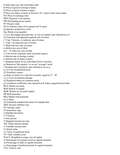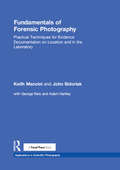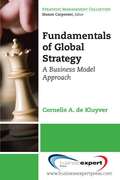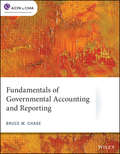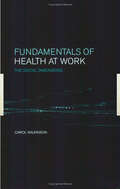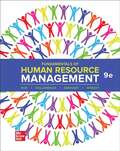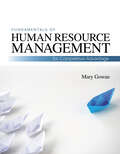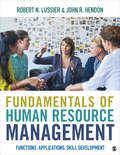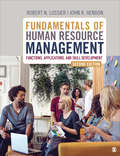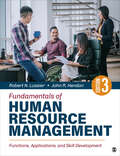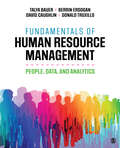- Table View
- List View
Fundamentals of Financial Management
by Eugene F. Brigham Joel F. HoustonEquip students with an understanding of corporate finance and financial management using the contemporary approach and powerful examples in Brigham/Houston's FUNDAMENTALS OF FINANCIAL MANAGEMENT, 16E. This longtime market leader addresses the latest developments in finance today, from significant change in corporate tax code to the multiple effects and economic impact of the coronavirus pandemic. The authors use innovative learning tools to balance contemporary theory with practical applications and help students understand the social responsibility of businesses, corporate budgeting, financing, working capital decision-making, forecasting, valuation and Time Value of Money. The authors also provide authoritative insights into changing technology and globalization, the evolution of financial markets and ongoing shifts in the today's political and economic environments. In addition, updated MindTap digital resources offer new learning modules, algorithmic testing and an optimized learning path.
Fundamentals of Financial Management
by Joel F. Houston; Eugene F. BrighamUsing the innovative approach and powerful examples that have become the signature of this longtime market leader, Brigham/Houston's FUNDAMENTALS OF FINANCIAL MANAGEMENT, 15e continues to equip learners with a thorough understanding of the ""what"" and the ""why"" of corporate finance and financial management. Its unique balance of clear concepts, contemporary theory, and practical applications ensures readers understand the concepts and reasons behind corporate budgeting, financing, working capital decision-making, forecasting, valuation, and Time Value of Money. The authors also provide authoritative insight into the federal debt, the ongoing recovery of financial markets, the European debt crisis, and more. In addition hands-on exercises enable learners to put what they learn into real-world practice.
Fundamentals of Financial Management (Concise Fifth Edition)
by Eugene F. Brigham Joel F. HoustonThis book is intended for use in an introductory finance course and provides clear concepts and contemporary theory of finance.
Fundamentals of Financial Management (Thirteenth Edition)
by Eugene F. Brigham Joel F. HoustonWith the same contemporary approach and dynamic examples that made previous editions so popular, this fully revised thirteenth edition of FUNDAMENTALS OF FINANCIAL MANAGEMENT continues to provide students with a focused understanding of today's corporate finance and financial management.
Fundamentals of Financial Management: Concise Edition (Mindtap Course List Series)
by Eugene F. Brigham Joel F. HoustonGain a solid understanding of today's corporate finance and financial management with Brigham/Houston's market-leading FUNDAMENTALS OF FINANCIAL MANAGEMENT, CONCISE EDITION, 10E. A unique balance of the latest theory and hands-on applications introduces corporate finance with an emphasis on the concept of valuation throughout and Time Value of Money (TVM) early in the book - giving you ample time to absorb the concepts fully. Discussions review the effects of today's changing technology and globalization, the evolution of financial markets in recent years, on-going shifts in the global political and economic environment and the impact of tax cuts and jobs acts. Recent examples, applications and integrated cases offer insights into the reasons behind corporate budgeting, financing and working capital decision making. In addition, MindTap for Finance offers updated Excel Spreadsheet Models, an Adaptive Test Prep app, interactive eReader and Excel Online (EO) Problems as well as "how to" videos, Concept Clips and walk-through solutions videos.
Fundamentals of Financial Planning
by James F. Dalton Michael A. Dalton Thomas P. Langdon Joseph M. GilliceHere are all the essential basics of financial planning woven into the realities of working with real clients and building a successful practice. Inside are seven different ways to analyze a client situation, then how to best communicate and work with clients in their best interests. Using real data and relevant case examples, Fundamentals of Financial Planning takes you logically through the process of client behavior, motivation goal-setting and analysis, and risk management, education funding and investment management, and the critical influence of time on the value of money. In addition, the text provides guidance on developing the soft skills, such as developing a relationship of trust with the client, communicating effectively, and understanding client behavior and motivation, which are vital to a successful planning engagement. This is an essential text that puts fundamental academics into a real -life context to help ensure that concepts and best practices are comprehended, retained and ready for deployment.
Fundamentals of Forensic Photography: Practical Techniques for Evidence Documentation on Location and in the Laboratory (Applications in Scientific Photography)
by Keith Mancini John SidoriakIn Fundamentals of Forensic Photography, Keith Mancini and John Sidoriak offer practical techniques for common situations encountered in forensic documentation. Topics include equipment selection, lighting techniques, crime scene and evidence documentation, macro and micro photography as well as aerial, high speed and computational photography. Techniques for photographic documentation in both the laboratory and the field are discussed.
Fundamentals of Funeral Directing: Building a Professional Cornerstone
by J. Chandler Altieri John B. FritchThe funeral service profession is changing and evolving rapidly, and funeral service education resources are not keeping up with the pace. Monumental changes are occurring with respect to preferred methods of disposition and the services desired by families. Additionally, the merchandise sought after by consumers and contemporary business methods are profoundly different than in the recent past. Prior to the publication of Fundamentals of Funeral Directing: Building a Professional Cornerstone, the only textbooks available were littered with outdated and factually incorrect information. This book is meeting the demands and requirements of Funeral Service educators and students alike. This is a comprehensive text published to assist Funeral Service educators in preparing students for a successful professional career. Consistent with other publications of the Funeral Service Educational Resource Center, experts in various fields were identified, and requested to provide their expertise in assisting with writing this book. Furthermore, we went beyond "old" texts and resources, and sought out current and relevant information, as we believe educators and students deserve to be proud of the educational resources available in our discipline.
Fundamentals of Futures and Options Markets
by John C. HullDirected primarily toward undergraduate finance students, this text also provides practical content to current and aspiring industry professionals. <P><P>Based on Hull's Options, Futures and Other Derivatives, Fundamentals of Futures and Options Markets presents an accessible overview of the topic without the use of calculus. Packed with numerical examples and accounts of real-life situations, this text effectively guides readers through the material while helping them prepare for the working world.
Fundamentals of Geothermal Heat Pump Systems: Design and Application
by Louis LamarcheFundamentals of Geothermal Heat Pump Systems: Design and Application is written for upper-level undergraduate and graduate courses in renewable energy and heat transfer. This classroom-tested text covers ground heat exchanger modeling, secondary loop ground-source system design, pumping energy, thermal response testing, commercial building applications, and horizontal and groundwater ground heat exchangers. The book is oriented to practical applications, including the economic analysis of ground source heat pump (GSHP) systems, but more theoretical sections are provided covering research-related geothermal applications. Chapters on heat transfer fundamentals and heat pump concepts are included for readers less familiar with thermal engineering concepts. A chapter covering the economic analysis of GSHP systems is also included. All of the examples and problems in the book are solved using the open-source Python programming language.The book will provide students in geothermal energy courses with a solid understanding of the subject. It will also be a valuable reference for professionals working in the field of renewable energy.
Fundamentals of Global Air Transport Geography (Aviation Fundamentals)
by George ArbuckleThe commercial air transport industry can be broadly split into three component parts: airlines, airports and aircraft. Each of these components is shaped by geography, insofar as each is influenced by places, landscapes, environments, people and their various interactions. Conversely, air transport plays a large role in shaping the various themes of geography and the position of our physical, human and environmental world. It connects people, cultures and businesses across every continent and generates economic growth, allows international trade to occur and develops tourism. It can also be involved in creating negative outputs, such as emissions, noise and loss of biodiversity, which can have a large impact on the planet and quality of life. A lack of air transport links can also have a significantly negative impact on world regions in terms of economic and cultural development. In short, air transport and geography are inextricably linked.Fundamentals of Global Air Transport Geography details the geography of the global commercial air transport industry. The book aims to provide an understanding of these key areas at an introductory level, in order to be accessible to students and non-technical airport/airline management. A key theme throughout the book will not only be how geographical issues have influenced air transport, but also how air transport continues to influence geography. Each chapter boasts a range of features aimed at enhancing the reader’s understanding, including learning objectives, discussion questions and case studies, and lecturers can find supporting resources including PowerPoint slides and teaching notes online.
Fundamentals of Global Strategy
by Cornelis A. de KluyverThis book looks at the opportunities and risks associated with staking out a global competitive presence and introduces the fundamentals of global strategic thinking. We define crafting a global strategy in terms of change: how a company should change and adapt its core (domestic) business model to achieve a competitive advantage as it expands globally. The conceptual framework behind this definition has three fundamental building blocks: a company's core business model, the various strategic decisions a company needs to make as it globalizes its operations, and a range of globalization strategies for creating a global competitive advantage. A business model is defined in terms of four principal components: (a) market participation--who its customers are, how it reaches them and relates to them; (b) the value proposition--what a company offers its customers; (c) the supply chain infrastructure--with what resources, activities and partners it creates its offerings; and finally, (d) its management model--how it organizes and coordinates its operations. Globalization requires a company to make strategic decisions about each component of the business model. Market participation decisions include choosing which specific markets or segments to serve, domestically or abroad; what methods of distribution to use to reach target customers; and how to promote and advertise the value proposition. Globalization decisions about the value proposition touch the full range of tangible and intangible benefits a company provides to its customers (stakeholders). Decisions about a company's value chain infrastructure deal with such questions as, What key internal resources and capabilities has the company created to support the chosen value proposition and target markets? What partner network has it assembled to support the business model? How are these activities organized into an overall, coherent value creation and delivery model? Finally, strategic decisions about the global management dimension are concerned with a company's choices about a suitable global organizational structure and decision-making process. We use Pankaj Ghemawat's well-known "AAA Triangle" framework to define three generic approaches to global value creation. Adaptation strategies seek to increase revenues and market share by tailoring one or more components of a company's business model to suit local requirements or preferences. Aggregation strategies focus on achieving economies of scale or scope by creating regional or global efficiencies; they typically involve standardizing a significant portion of the value proposition and grouping together development and production processes. Arbitrage is about exploiting economic or other differences between national or regional markets, usually by locating separate parts of the supply chain in different places.
Fundamentals of Governmental Accounting and Reporting (AICPA)
by Bruce W. ChaseFundamentals of Governmental Accounting and Reporting features the foundational tenets of governmental accounting and reporting in today's environment. Featuring updated accounting for GASB Statement No. 84, and fiduciary activities, this work reviews underlying concepts and shows how they are applied through real-life examples of CAFR, financial statements and updates of recent GASB standards.Key areas covered include: The governmental environment and GAAP Fund accounting and the financial reporting model Budgeting MFBA Revenues and expenditures Governmental, proprietary, and fiduciary funds Government-wide financial statements CAFR Special purpose governments Deferred outflows of resources and deferred inflows of resources
Fundamentals of Health at Work
by C. WilkinsonFundamentals of Health at Work is an engaging re-assessment of workplace health, with particular emphasis on the neglected issues of the social context of the working environment and the impact on individuals of their workplaces. In looking at the historical context of the subject and at the concepts of health and illness, a selective series of tho
Fundamentals of Human Resource Management
by John R. Hollenbeck Raymond A. Noe Barry A. GerhartFundamentals of Human Resource Management 9th Edition provides a complete, concise introduction to human resource management for the general business manager who wants to learn more about how HRM is used in the everyday work environment. Its adaptive learning program and its engaging, focused, and applied content make it the fastest growing HRM program on the market. The authors have won numerous prestigious teaching and research awards. This, along with their teamwork and consulting experience, delivers a learning program strong in depth and breadth, and current in research and practice simply not found in other products.
Fundamentals of Human Resource Management (Seventh Edition)
by Patrick M. Wright John R. Hollenbeck Raymond A. Noe Barry GerhartFundamentals of Human Resource Management provides a complete introduction to human resource management for the general business manager who wants to learn more about how HRM is used in the everyday work environment. Its adaptive learning program and its engaging, focused, and applied content make it the fastest growing HRM program on the market.
Fundamentals of Human Resource Management: For Competitive Advantage
by Mary GowanFundamentals of Human Resource Management for Competitive Advantage delves into the essential principles and practices of human resource management with a focus on gaining a competitive edge in the modern business landscape. A wide variety of learning tools in each chapter keeps students engaged and helps them bridge the gap between theoretical concepts and real-world applications.
Fundamentals of Human Resource Management: For Competitive Advantage
by Mary GowanFundamentals of Human Resource Management for Competitive Advantage delves into the essential principles and practices of human resource management with a focus on gaining a competitive edge in the modern business landscape. A wide variety of learning tools in each chapter keeps students engaged and helps them bridge the gap between theoretical concepts and real-world applications.
Fundamentals of Human Resource Management: Functions, Applications, Skill Development
by John R. Hendon Professor Robert N. LussierFundamentals of Human Resource Management: Functions, Applications, Skill Development takes a unique three-pronged approach that gives students a clear understanding of important HRM concepts and functions, shows them how to apply those concepts, and helps them build a strong skill set they can use in their personal and professional lives. Covering the vast majority the 210 required SHRM Curriculum Guidebook topics required for undergraduates, Fundamentals of Human Resource Management gives the student the ability to successfully manage others in today's work environment. Authors Robert N. Lussier and John R. Hendon engage students with a variety of high-quality applications and skill development exercises to improve students’ comprehension and retention. The authors’ emphasis on current trends and the challenges facing HR managers and line managers today provide students with key insights on important issues and prepare them for successful careers.
Fundamentals of Human Resource Management: Functions, Applications, Skill Development
by John R. Hendon Professor Robert N. LussierFundamentals of Human Resource Management: Functions, Applications, Skill Development takes a unique three-pronged approach that gives students a clear understanding of important HRM concepts and functions, shows them how to apply those concepts, and helps them build a strong skill set they can use in their personal and professional lives. Covering the vast majority the 210 required SHRM Curriculum Guidebook topics required for undergraduates, Fundamentals of Human Resource Management gives the student the ability to successfully manage others in today's work environment. Authors Robert N. Lussier and John R. Hendon engage students with a variety of high-quality applications and skill development exercises to improve students’ comprehension and retention. The authors’ emphasis on current trends and the challenges facing HR managers and line managers today provide students with key insights on important issues and prepare them for successful careers.
Fundamentals of Human Resource Management: Functions, Applications, and Skill Development
by John R. Hendon Professor Robert N. LussierLearn by doing! Fundamentals of Human Resource Management: Functions, Applications, Skill Development helps students of all majors build the skills they need to recruit, select, train, and develop employees. Bestselling authors Robert N. Lussier and John R. Hendon explore the important strategic function HR plays in today's organizations. A wide variety of applications, self-assessments, and experiential exercises keep students engaged and help them see the relevancy of HR as they learn skills they can use in their personal and professional lives. The Second Edition includes 13 new case studies and new coverage of the agile workplace, generational differences, gamification, social media, and diversity and inclusion.
Fundamentals of Human Resource Management: Functions, Applications, and Skill Development
by John R. Hendon Professor Robert N. LussierLearn by doing! Fundamentals of Human Resource Management: Functions, Applications, Skill Development helps students of all majors build the skills they need to recruit, select, train, and develop employees. Bestselling authors Robert N. Lussier and John R. Hendon explore the important strategic function HR plays in today's organizations. A wide variety of applications, self-assessments, and experiential exercises keep students engaged and help them see the relevancy of HR as they learn skills they can use in their personal and professional lives. The Second Edition includes 13 new case studies and new coverage of the agile workplace, generational differences, gamification, social media, and diversity and inclusion.
Fundamentals of Human Resource Management: Functions, Applications, and Skill Development
by Robert N. Lussier John R. HendonFundamentals of Human Resource Management: Functions, Applications, and Skill Development, Third Edition helps students of all majors build the skills they need to recruit, select, train, and develop people. Bestselling authors Robert N. Lussier and John R. Hendon explore the important strategic function HR plays in today′s organizations. A wide variety of applications, online self-assessments, and experiential exercises keep students engaged and help them see the relevancy of HR as they learn skills they can use in their personal and professional lives. The Third Edition includes 13 new case studies and new coverage of virtual and flexible work resulting from the COVID-19 pandemic, the long-lasting effects the pandemic has had on women in the workforce, artificial intelligence use within HR, and diversity and inclusion.
Fundamentals of Human Resource Management: Functions, Applications, and Skill Development
by Robert N. Lussier John R. HendonFundamentals of Human Resource Management: Functions, Applications, and Skill Development, Third Edition helps students of all majors build the skills they need to recruit, select, train, and develop people. Bestselling authors Robert N. Lussier and John R. Hendon explore the important strategic function HR plays in today′s organizations. A wide variety of applications, online self-assessments, and experiential exercises keep students engaged and help them see the relevancy of HR as they learn skills they can use in their personal and professional lives. The Third Edition includes 13 new case studies and new coverage of virtual and flexible work resulting from the COVID-19 pandemic, the long-lasting effects the pandemic has had on women in the workforce, artificial intelligence use within HR, and diversity and inclusion.
Fundamentals of Human Resource Management: People, Data, and Analytics
by Talya Bauer Berrin Erdogan Donald M. Truxillo David E. CaughlinFundamentals of Human Resource Management: People, Data, and Analytics provides a current, succinct, and interesting introduction to the world of HRM with a special emphasis on how data can help managers make better decisions about the people in their organizations. Authors Talya Bauer, Berrin Erdogan, David Caughlin, and Donald Truxillo use cutting-edge case studies and contemporary examples to illustrate key concepts and trends. A variety of exercises give students hands-on opportunities to practice their problem-solving, ethical decision-making, and data literacy skills. Non-HR majors and HR majors alike will learn best practices for managing talent in today&’s ever-evolving workplace.


